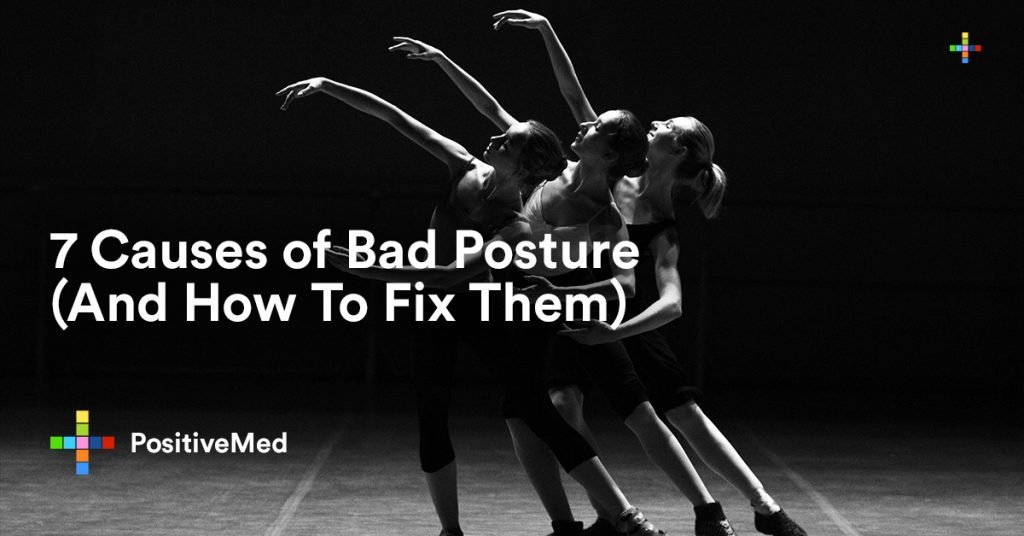Hunting the cause of your chronic back and neck pain? Chances are bad posture is to blame, and you might be surprised at common mistakes you’re making that cause it:

Digital Device Use
Ever heard the term “text neck”? This colloquialism refers to the forward head posture of a person looking down at their digital device, as they text for example. The rise in popularity of technology use – from smartphones to tablets and laptops – has resulted in a phenomenon coined “Forward Head Syndrome.” As more and more people spend their workdays on computers and young people especially become attached to their digital devices, the constant looking down is negatively affecting posture.
As your neck and head crane inches past your shoulders, the muscles and tendons in your back have to work harder and harder to stabilize your spine – this places added strain and inflammation on vulnerable tissues and overtime can result in pain, tightness, and perpetuated bad posture. Devices like standing desks and monitor stands can help regulate the height differential between yourself and your work station, and best practices like holding your phone in front of you when texting and using apps can prevent you from constantly looking down.
Crossing Legs
Sitting down in a chair with your legs crossed often times seems the most natural body position – at work, at dinner with friends, even sitting on your own couch watching TV. Crossing your legs poses an interesting challenge to your spine and hips, however, as it induces pelvic imbalance.
When your hips are off center, this alters your spinal alignment and can precipitate back, hip, knee and even leg pain. Crossing legs has also been linked to changes in blood pressure. Be mindful of how you’re sitting in both lengthening and straightening the spine, but also avoiding crossing your legs.
Inactivity
Regular aerobic fitness does wonders for your physical and mental health, but it is also beneficial for your posture. By routinely stretching and engaging key muscles groups like the back and the core, you are keeping muscles pliable and lengthened. Inactivity on the other hand can result in muscles stiffening and shortening up, making it harder and harder to sit up straight and avoid slouching.
Inactivity combined with an imbalanced diet can lead to weight gain which also negatively impacts posture. Carrying extra weight around not only stresses internal joints, muscles, and bones, but it can alter your center of gravity, making it more difficult to practice good posture.
Cradling Your Phone
Taking a call on your phone while attempting to continue a task like typing or cooking is easiest when you use a headset, but what happens when you can’t find your earbuds or your bluetooth? Many people end up trying to hold their phone by bending their neck sideways and cradling the phone between their ear and shoulder.
This body position not only stiffens neck and shoulder joints, but it pulls on susceptible connective tissues and can even lead to shift in the upper spine. When talking on the phone if you are unable to hold the phone with your hand to your ear, experts recommend using a headset or putting it on speaker to avoid prolonged and dangerous neck pain.
Age
The general wear and tear as well as a reduction in activity levels can lead to some posture issues as you age. Muscles and bones can naturally become weaker, and decades of slouching or crossing legs can catch up with you.
Even older adults are recommended to stretch and strengthen vital muscle groups to maintain good posture and avoid developing hyperkyphosis (or humpback). Some wearable aids, like a back brace for men and women, can help support good posture, provide some back pain relief, and even stabilize the spine and adjacent tendons, ligaments, and muscles too.
related link: Here Is How to Use Tennis Ball to Relieve Your Sciatic Nerve Pain and…
Slouching
The most common bad posture culprit, slouching is the general slumping position when sitting that brings the pelvis forward and the spine hunched and leaning back. Much of the average person’s day is spent sitting – at work, eating meals, watching TV – so it is easy to fall into the routine of slumping and slouching when your body tires of sitting up straight.
Some mobile apps have been developed for smartphones which can sit in your pocket and buzz you if there is an indication you are slouching. Other good practices include sitting on stability balls to practice balance and spinal alignment, as well as exercising neck, back and core muscles to strengthen them so your body doesn’t fatigue when practicing good posture.
Overworking Muscle Groups
Paradoxically, some people who do work out heavily and even lift weights may experience bad posture symptoms like rounded shoulders. Why? It’s all about the strength and weakness of key muscle groups. For a person who focuses much of their workout attention on their core, legs, and arms, they might forget their chest and upper back.
Weaker muscles around the top of the spine and chest can lead to a concave or rounded shoulders body position instead of a straight and lengthened spine. When exercising, it’s important to remember to stretch and strengthen the upper back and chest muscles to reinforce the spine and good posture practice.
Bad posture isn’t just bad for back health but can lead to other complications like painful headaches, diminished breathing, cardiovascular issues, joint inflammation, and hip and knee problems. Get your posture in check today by tackling common body mistakes like sitting cross-legged and not exercising.







